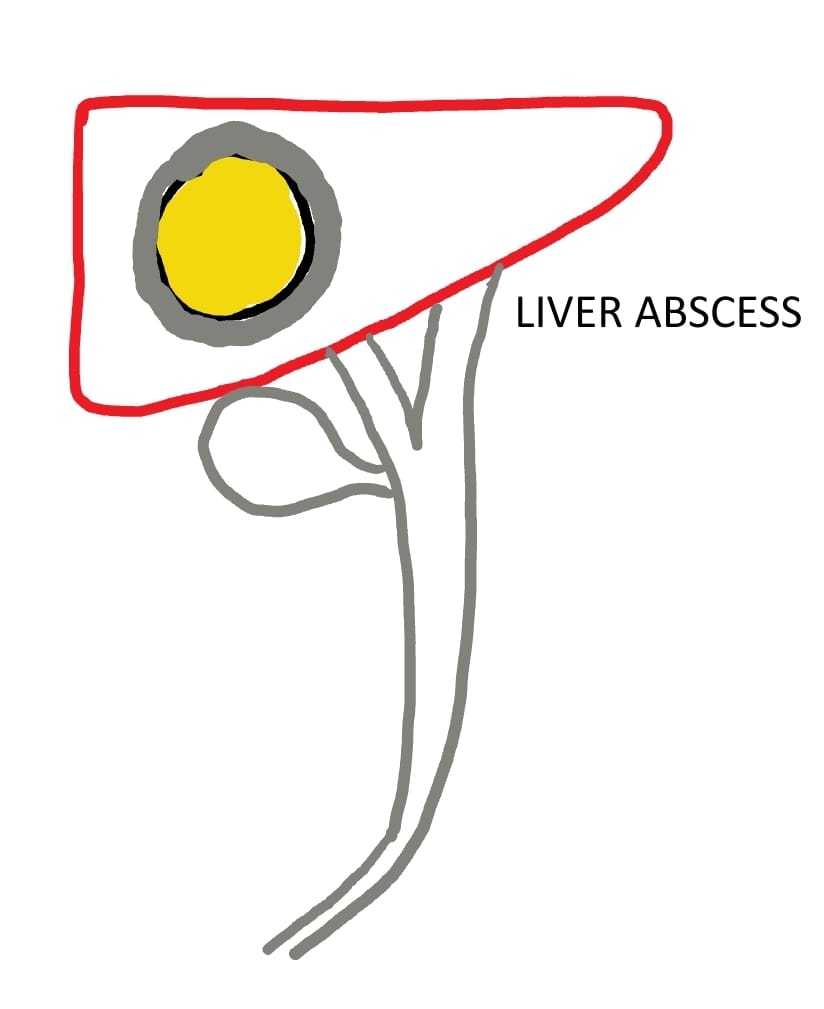Liver Abscess Treatment in Hyderabad
Best Gastroenterologist in Hyderabad
If you’re struggling with gastrointestinal diseases, pay a visit to Dr. Dinesh Reddy who is a skilled gastroenterology doctor in Hyderabad. Along with his team of medical specialists, he offers treatments with excellent results to his patients.
Dr. Dinesh understands the various complications of gastrointestinal diseases and the impact they have on our day-to-day lives. Therefore, he works hard to provide optimal care for his patients with a friendly and compassionate approach.
Take the first step towards relief and book an appointment with leading gastroenterology specialist in Hyderabad. Experience the best treatment for gastrointestinal diseases with Dr. Dinesh Reddy and his team of specialists.
What is Liver Abscess?

A liver abscess is like a pocket of pus in your liver caused by germs.If you have a liver abscess, you might feel feverish, get aches in your upper right belly, or turn yellow (jaundice). Doctors can help by giving you antibiotics and sometimes draining the pus. If you see these signs, go to a doctor fast. Stay clean, be healthy, and deal with other health issues to avoid liver abscesses. It’s super important to talk to a doctor for the right diagnosis and treatment.
Types of Liver Abscess
- Pyogenic Liver Abscess
- Amoebic Liver Abscess
- Fungal Liver Abscess
- Iatrogenic Liver Abscess
Which factors can lead to Liver Abscess
- Infections:
- Medical Conditions:
- Invasive Procedures
- Liver Conditions
- Immune System Weakness
What are the common symptoms of Liver Abscess disease?
- Persistent Fever
- Abdominal Pain
- Jaundice
- Nausea
- Vomiting
- Unexplained Weight Loss
How is Liver Abscess disease diagnosed?
To find out if you have a liver abscess, the doctor will ask about your symptoms and check your belly. They might do some tests, like blood tests or pictures of your liver using ultrasound or CT scans. These tests help the doctor know if you have an abscess, where it is, and how big it is. Once they figure that out, the doctor can decide on the right treatment for you
What is the treatment of Liver Abscess?
When you have a liver abscess, it’s a serious issue, and you need to see a doctor right away. The treatment usually includes taking medicines and sometimes getting rid of the extra stuff in the abscess. Let’s talk about the simple steps to treat a liver abscess.
- Medicines
- Pain Relief
- Avoiding carbonated drinks, tea and coffee, spicy and masala foods, and junk foods.
- Maintaining regular eating habits.
- Exercising and reducing weight.
- Medications that help reduce the acid production in the stomach and help in containing it.
Frequently Asked Questions
Here are answers to some of the questions you might have about Acid Reflux
Getting better from a liver abscess usually takes a few weeks, but it can vary. The key is to catch it early and start treatment quickly. If you have drainage or take antibiotics, you might start feeling better in a few days. But to fully recover, it could take a few weeks or even months, depending on how big the abscess is and your overall health. Just make sure to take your medicine like your doctor says, go to your check-up appointments, and try to stay healthy. If you have questions or need advice, always talk to your doctor—they know best about your recovery.
Liver abscesses can affect the heart indirectly. When the liver gets infected, harmful stuff can go into the bloodstream and reach the heart, causing problems. This can be serious, so it’s important to find and treat liver abscesses early. If you have symptoms like belly pain or fever, see a doctor right away for the right care. Taking care of liver issues promptly can help protect your heart and other parts of your body.
Liver abscesses happen when bad bacteria, like E. coli or Klebsiella, or amoebas, like Entamoeba histolytica, infect the liver. Eating contaminated food or drinking dirty water can cause these infections. Quick treatment is super important. The best way to treat liver abscesses is with antibiotics or antiparasitic drugs, depending on what caused them. It’s crucial to see a doctor for the right diagnosis and treatment plan to get better quickly. If you think you have a liver abscess, talk to healthcare experts to figure out the best steps to take.
To check if you might get a liver abscess, doctors look at things like stomach pain, fever, and recent illnesses. They might use pictures like ultrasounds or CT scans to see if anything’s wrong with your liver. Blood tests help find signs of infection. If you have a liver abscess, the best way to treat it is with medicine (antibiotics), and sometimes they might need to take out the pus (drainage) or do surgery. It’s important to find it early and get treated quickly for the best results. Going to check-ups, keeping clean, and managing other health issues can help stop liver abscesses. Ask your doctor for advice on the right treatment for you.
Getting better from a liver abscess can take a few weeks to months. The best way to treat it is by using antibiotics to kill the infection and sometimes draining the abscess. How fast you get better depends on things like how healthy you are and when you start treatment. Listen to what your doctor says, take the medicines they give you, and go to your check-up appointments for the best results. If you still feel sick or have worries, talk to your doctor. Finding and treating the liver abscess early is really important for getting better.
Related topics:
Liver Abscess Treatment in Hyderabad

Dr. K V Dinesh Reddy
MBBS; MS (Gen.Surg); DNB (Surg.Gastro)
Dr. K V Dinesh offers the best Liver Abscess treatment in Hyderabad with over 10 years of expertise in the field of gastroenterology.
He has treated hundreds of patients with gastrointestinal disorders and has built a positive relationship with them. Dr. Dinesh and his team of gastroenterology specialists strive to provide quality treatments to those in need.
He strongly believes that surgery should only be considered as a last resort and prefers a holistic approach to treatment. He never recommends surgery if a disease can be treated entirely through the use of medications.

